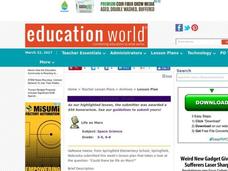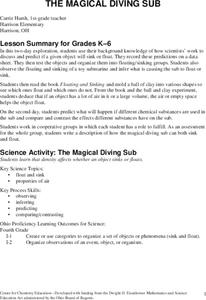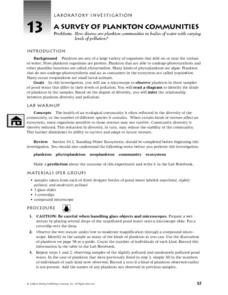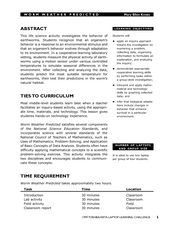Curated OER
Water Cycle
Identify and interpret the earth's different water sources. Third and fourth graders describe and demonstrate the process of the water cycle, make a model of its two main parts, and predict and infer to answer questions about the model.
Curated OER
Life on Mars
Learners research the feasibility of life on Mars and debate what it would need in order to sustain life. They work in teams to predict, research, infer, and explain their theory using models they build.
Have Fun Teaching
Growing Seeds (9)
A seed, water, and sunlight. A seed, water, but no sunlight. A seed, sunlight, but no water. Young biologists are ask to infer what will happen to seeds given five different growing conditions.
Curated OER
Deep Convective Clouds
Students observe clouds. In this deep convective clouds lesson, students analyze cloud data recorded over one month and draw conclusions based on results. Students predict "Thunderstorm Season" and prepare to defend their decision using...
Curated OER
Round and Round
Learners interpret data from a three-dimensional array of current monitors to determine an overall pattern of water circulation. They hypothesize what effect an observed water circulation pattern might have on seamount fauna. A very...
Curated OER
Foliage Tracker
Young scholars discuss the change of leaf colors and the role that climate and elevation play in those changes. They then track leaf changes, input data, and graph foliage changes with a free online tool.
It's About Time
Energy Flow in Ecosystems
Emerging biochemists more fully understand the flow of energy in ecosystems as they explore the laws of thermodynamics and relate them to energy transfer in food chains. They also investigate heat loss from the human body and how...
Curated OER
Teaching Science Process Skills
Teaching science process skills is a vital part of helping students become good scientists.
Curated OER
The Magical Diving Sub
First graders discuss and predict if a given object sinks or floats. They record their predictions on a data sheet. Pupils test the objects and organize them into floating/sinking groups. Students observe the floating and sinking of a...
It's About Time
Concentrating on Collisions
How important is momentum? Pupils investigate and apply the definition of momentum as they conduct analyses during a series of one-dimensional collisions. They infer the relative masses of two objects by carefully staging and predicting...
Berkshire Museum
The Three Life-Giving Sisters: Plant Cultivation and Mohican Innovation
Children gain first-hand experience with Native American agriculture while investigating the life cycle of plants with this engaging experiment. Focusing on what the natives called the Three Sisters - corn, beans, and squash - young...
It's About Time
Volcanic Landforms
Did you know the word volcano comes from the name of the Roman god of fire, Vulcan? During this activity, scholars make a topographic map, interpret topographic maps, and infer how lava will flow based on their analysis.
Curated OER
The Frog and the Ol' Black Fly
Students explore frogs. For this cross curriculum literacy and frogs lesson, students predict the plot and then listen to the book The Wide-Mouthed Frog by Keith Faulkner. Students define "predator" and identify foods a frog might eat. ...
Ohio Department of Education
Observe Then Infer
Upper elementary scientists learn that observations made can lead to inferences. They rotate through six weather-related stations that challenge them to make observations and then draw inferences from their observations. A...
Curated OER
Endangered Species
Ninth graders graph data in order to compare the number of extinct species and a rise in human population. They analyze the data collected. Students are encouraged to infer the relationship.
Curated OER
Tracking Ocean Ecology
Students look at the data maps given to them about how chlorophyll affects the algae blooms and make predictions about the harm they will cause. In this data maps lesson plan, students manipulate data sets from the website.
It's About Time
Plate Boundaries and Plate Interactions
How does the Earth continually repair itself? Explore the answer to this question, and others, with a unit on plate boundaries and interaction. Pupils classify the types of movement at plate boundaries and identify the distribution of...
Tracy Pendry
Cardiovascular/Circulatory System
Explore the circulatory system with a cardiovascular pump activity that promotes discovery and discussion as class members create a functioning model of the heart. Continue the learning process through a web quest showcasing the body's...
Curated OER
Animals, Soil, Trees
Fourth graders describe the various kinds of soils and how plants and animals are affected by them. They describe the baic needs of plants, scoring at least a 3 or 4 on a 4-point rubic. Students are able to predict and/or infer what...
Curated OER
Drugged Out Daphnia
Students make predictions and investigate (using a microscope) the effects of nicotine, caffeine, aspirin, alcohol, and sleeping pills on cultures of fresh water Daphnia.
Curated OER
A Survey of Plankton Communities
In this biology worksheet, students identify and define the vocabulary terms listed and make a prediction about the outcomes of the experiment. Then they complete the chart of the observations of the plankton diversity in drops of pond...
Curated OER
Sea Floor Spreading
Students discuss convection currents in the Earth's mantle, how they form, and how they move as well as the causes of earthquakes. Working in a group, they analyze a color coded World Earthquake Map and try to determine which direction...
Curated OER
Worm Weather Predicted
Students examine worm habitats. In this animal habitats lesson, students participate in a lab activity that requires them to explore the adaptations that earthworms make to their environment.
Virginia Department of Education
Determining Absolute Age
How can radioactive decay help date old objects? Learners explore half-life and radioactive decay by conducting an experiment using pennies to represent atoms. Young scientists graph data from the experiment to identify radioactive decay...

























